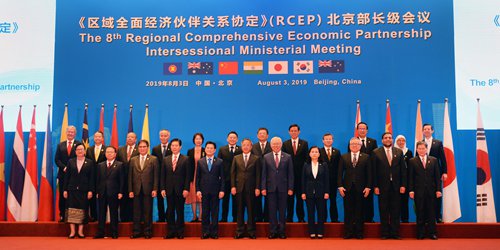HOME >> BUSINESS
RCEP talks accelerate amid challenges
By Song Lin Source:Global Times Published: 2019/8/4 19:03:39
Ministerial meeting completes more than 65% market access items

Photo: IC
A just-concluded ministerial meeting on the Regional Comprehensive Economic Partnership (RCEP) negotiations achieved significant progress, but the remaining work is more critical and all parties must redouble their efforts amid rising US protectionism and a tit-for-tat trade fight between Japan and South Korea, experts said.
More than two-thirds of the negotiations on bilateral market access were concluded at the ministerial meeting held in Beijing on Friday and Saturday, and the remaining negotiations are being actively promoted, the Xinhua News Agency reported on Saturday, citing China's Ministry of Commerce.
In terms of negotiations on rules, all participants have reached consensus on more than 80 percent of the text of the agreement, with newly completed negotiations on sectors including finance, telecommunication and professional services, according to Xinhua.
After the ministerial meeting, attendees including Thailand's Deputy Prime Minister and Commerce Minister, Jurin Laksanawisit, called for wrapping up the negotiations within the year, the Bangkok Post reported on Sunday.
The RCEP, initiated by the Association of Southeast Asian Nations (ASEAN) in 2012, is a proposed multilateral free trade agreement among the 10 ASEAN countries and six other trade partners - China, Japan, the Republic of Korea, Australia, New Zealand and India.
As the biggest FTA negotiation in Asia currently, the RCEP group covers 47.4 percent of world population, 32.2 percent of global GDP, 29.1 percent of trade worldwide and 32.5 percent of global investment, said Xinhua.
The negotiations for the RCEP were launched in late 2012. After nearly seven years of effort, the biggest FTA negotiation in Asia is expected to be completed by the end of the year.
"All 16 members among the RCEP negotiations have realized the urgency of multilateral cooperation, given the backdrop of the US' protectionism, which would bring serious damage to the global economy," Zhang Jianping, director general with the Center for Regional Economic Cooperation under the Ministry of Commerce, told the Global Times on Sunday.
Forming multilateral free trade agreement bloc can be an important tool for countries to cope with escalating uncertainty and market volatility, Zhang said.
However, critical challenges constantly emerged during the negotiations.
Xu Liping, director of the Center for Southeast Asian Studies of the Chinese Academy of Social Sciences, observed that "one of the major challenges lies in negotiations related to India's market access."
He noted that a trilateral group of India, Indonesia and Thailand under the RCEP was formed earlier this year to enhance the negotiations associated with India, which has helped pave the way for the following negotiations.
Another issue is the new friction between Japan and South Korea. Japan on Friday announced it would remove South Korea from its preferential trade "white list", and South Korea struck back with retaliatory measures hours later.
However, such disputes are hard to solve by themselves, and multilateral organizations could offer another path to settlement, Zhang said, adding that bilateral problems do send a negative signal for the RCEP negotiations but don't affect the big picture.
The Tokyo-Seoul dispute "has no connection with the RCEP negotiations," The Japan Times reported, citing Japanese Minister of Economy, Trade and Industry, Hiroshige Seko.
China has unswervingly upheld the multilateralism of the international trading system and stepped up efforts to promote RCEP negotiations as one of the major participants, Zhang said.
Right before the ministerial meeting in Beijing, the 27th round of RCEP negotiations was hosted by Zhengzhou, capital of Central China's Henna Province between July 22 and 31.
Posted in: INDUSTRIES,MARKETS